Schmitt C.B. (ed.) The Cambridge History of Renaissance Philosophy
Подождите немного. Документ загружается.

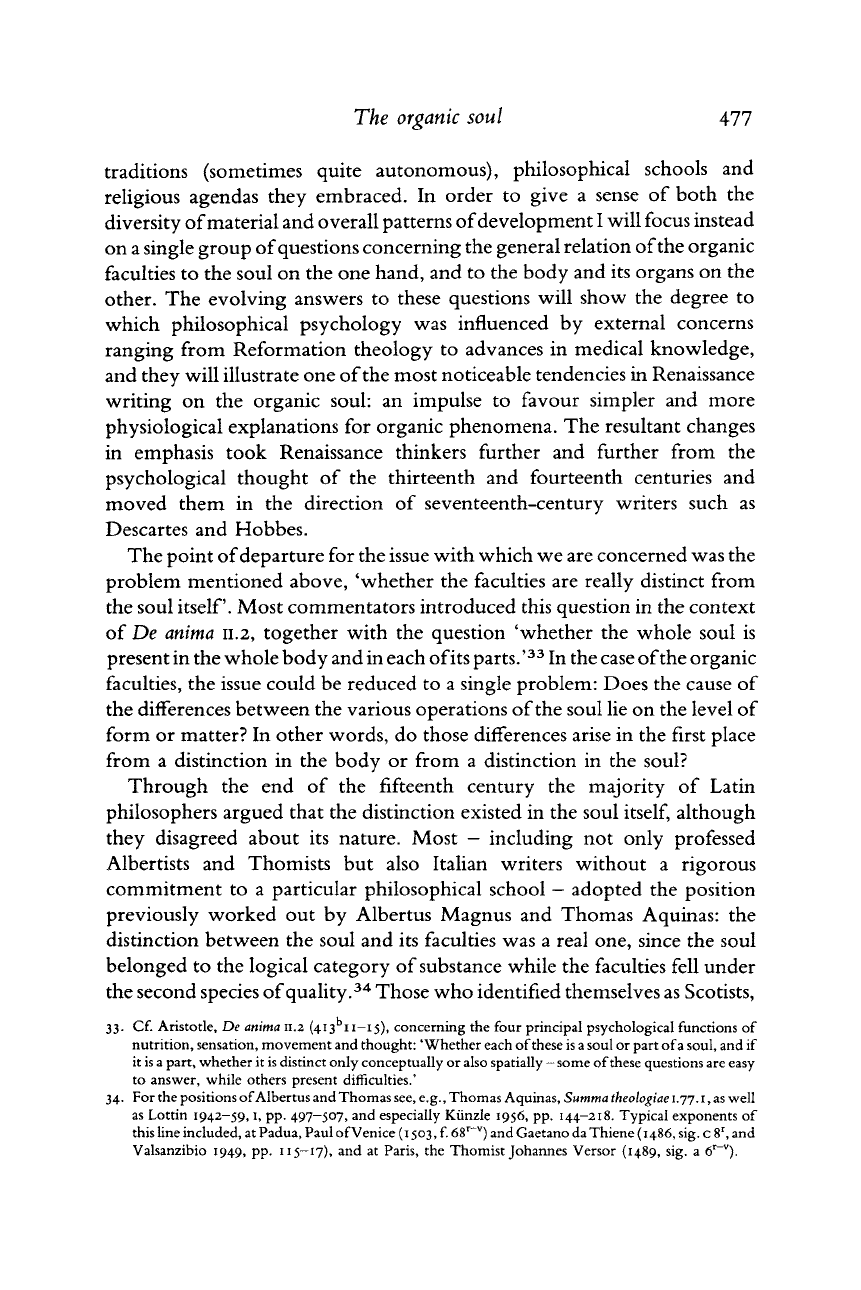
The
organic
soul
477
traditions
(sometimes quite autonomous), philosophical schools and
religious agendas they embraced. In
order
to give a sense of both the
diversity
of
material
and overall
patterns
of
development
I
will
focus instead
on
a
single group
of
questions concerning the general relation
of
the
organic
faculties to the soul on the one hand, and to the body and its organs on the
other.
The evolving answers to these questions
will
show the degree to
which philosophical psychology was influenced by external concerns
ranging
from Reformation theology to advances in medical knowledge,
and
they
will
illustrate one
of
the
most noticeable tendencies in Renaissance
writing on the organic soul: an impulse to favour simpler and more
physiological explanations for organic phenomena. The resultant changes
in emphasis took Renaissance thinkers further and further from the
psychological thought of the thirteenth and fourteenth centuries and
moved them in the direction of seventeenth-century writers such as
Descartes
and Hobbes.
The
point
of
departure
for the issue with which we
are
concerned was the
problem mentioned above, 'whether the faculties are really distinct from
the
soul itself. Most
commentators
introduced this question in the context
of
De
anima
11.2,
together with the question 'whether the whole soul is
present
in the whole body and in each
of
its
parts.'
33
In the
case
of
the
organic
faculties, the issue could be reduced to a single problem: Does the cause of
the
differences between the various operations
of
the
soul lie on the level of
form
or
matter?
In other words, do those differences arise in the first place
from
a distinction in the body or from a distinction in the soul?
Through
the end of the fifteenth century the majority of Latin
philosophers argued that the distinction existed in the soul itself, although
they disagreed about its
nature.
Most
—
including not only professed
Albertists and Thomists but also Italian writers without a rigorous
commitment
to a
particular
philosophical school - adopted the position
previously worked out by Albertus Magnus and Thomas Aquinas: the
distinction between the soul and its faculties was a
real
one, since the soul
belonged to the logical category of
substance
while
the faculties
fell
under
the
second species
of
quality.
34
Those who identified themselves as Scotists,
33. Cf. Aristotle, De anima
11.2
(
4
i3
b
n-i5),
concerning
the
four
principal
psychological
functions
of
nutrition,
sensation,
movement
and
thought:
'Whether
each
of
these
is a
soul
or part of a
soul,
and if
it is a part,
whether
it is
distinct
only
conceptually
or
also
spatially
—
some
of
these
questions
are
easy
to
answer,
while
others
present
difficulties.'
34. For the
positions
of Albertus and Thomas see, e.g., Thomas Aquinas, Summa theologiae
1.77.1,
as
well
as Lottin 1942-59,1, pp.
497-507,
and
especially
Kunzle 1956, pp. 144-218. Typical
exponents
of
this
line
included,
at Padua, Paul of
Venice
(1503, f.
68
r-v
)
and Gaetano da
Thiene
(i486,
sig. c 8
r
, and
Valsanzibio 1949, pp.
115-17),
and at Paris, the Thomist
Johannes
Versor
(1489,
sig. a
6
r_v
).
Cambridge Histories Online © Cambridge University Press, 2008
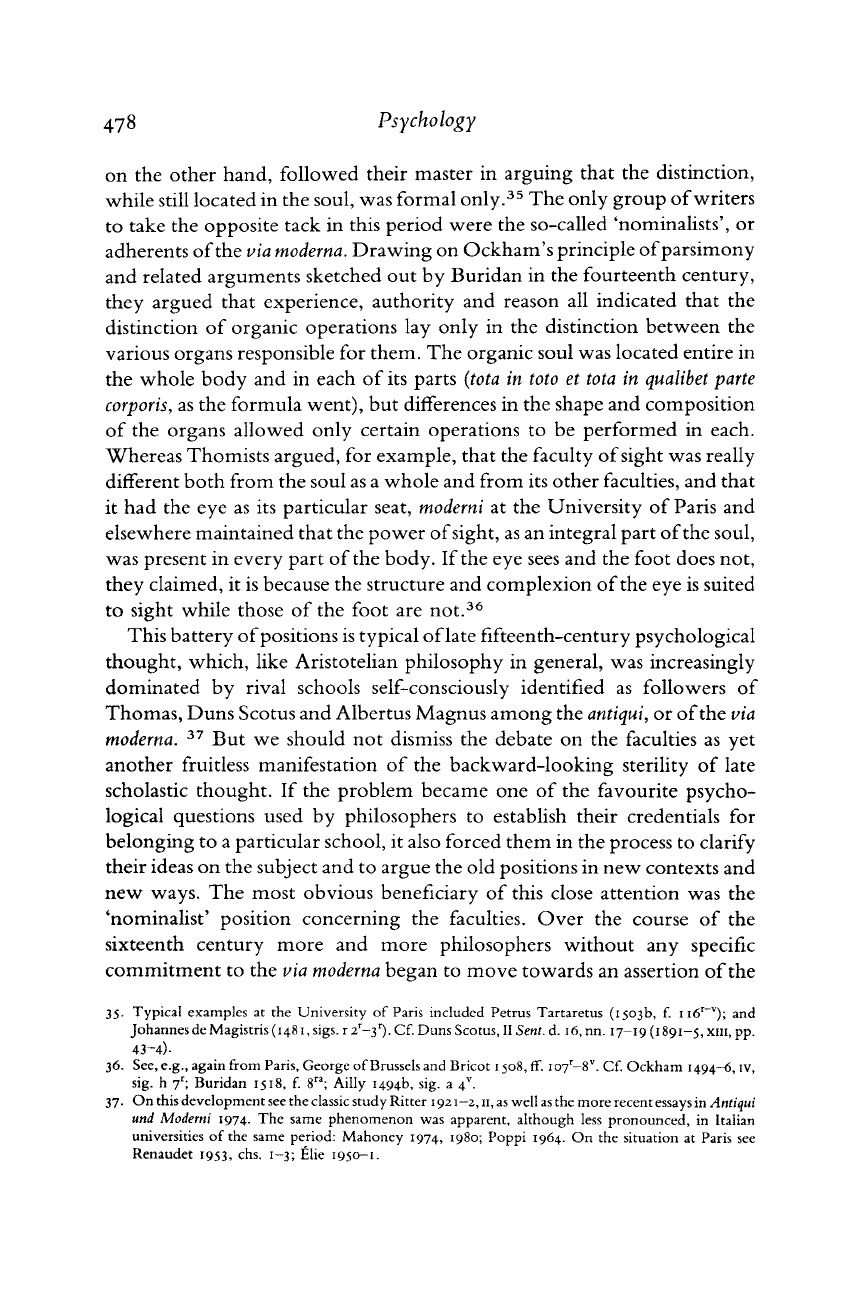
478
Psychology
on the other hand,
followed
their master in arguing that the distinction,
while
still located in the soul, was formal only.
35
The only group
of
writers
to
take the opposite
tack
in this period were the so-called 'nominalists', or
adherents
of
the
via
moderna.
Drawing on Ockham's principle
of
parsimony
and
related arguments sketched out by Buridan in the fourteenth century,
they argued that experience, authority and reason all indicated that the
distinction of organic operations lay only in the distinction between the
various
organs responsible for them. The organic soul was located entire in
the
whole body and in each of its
parts
(tota
in
toto
et
tota
in
qualibet
parte
corporis,
as the formula went), but differences in the shape and composition
of
the organs allowed only certain operations to be performed in each.
Whereas
Thomists argued, for example, that the faculty
of
sight was really
different both from the soul as a whole and from its other faculties, and that
it had the eye as its
particular
seat,
moderni
at the University of
Paris
and
elsewhere maintained that the power
of
sight, as an integral
part
of
the
soul,
was present in every
part
of the body. If the eye sees and the foot does not,
they claimed, it is because the
structure
and complexion of
the
eye is suited
to
sight
while
those of the foot are not.
36
This
battery
of
positions is typical
of
late
fifteenth-century psychological
thought, which, like Aristotelian philosophy in general, was increasingly
dominated by rival schools self-consciously identified as followers of
Thomas,
Duns Scotus and Albertus Magnus among the
antiqui,
or
of
the
via
moderna.
37
But we should not dismiss the debate on the faculties as yet
another
fruitless manifestation of the backward-looking sterility of late
scholastic
thought. If the problem became one of the favourite psycho-
logical questions used by philosophers to establish their credentials for
belonging to a
particular
school, it also forced them in the process to clarify
their
ideas on the subject and to argue the old positions in new contexts and
new ways. The most obvious beneficiary of this close attention was the
'nominalist' position concerning the faculties. Over the course of the
sixteenth century more and more philosophers without any specific
commitment
to the via
moderna
began to move towards an assertion
of
the
35.
Typical
examples
at the
University
of
Paris
included
Petrus
Tartaretus
(1503b,
f.
n6
r
~
v
);
and
Johannes
de Magistris
(1481,
sigs.
r
2
r
-3
r
).
Cf.
Duns
Scotus,
II Sent. d.
16,
nn.
17-19
(1891-5,
xm, pp.
43-4)-
36.
See, e.g.,
again
from
Paris, George of
Brussels
and Bricot
1508,
ff.
I07
r
-8
V
.
Cf. Ockham
1494-6,
iv,
sig. h 7
r
; Buridan
1518,
f. 8
ra
; Ailly
1494b,
sig. a 4
V
.
37.
On
this
development
see the
classic
study
Ritter
1921-2,11,
as
well
as the
more
recent
essays
in Antiqui
und
Moderni 1974. The
same
phenomenon
was apparent,
although
less
pronounced,
in
Italian
universities
of the
same
period:
Mahoney 1974, 1980; Poppi 1964. On the
situation
at
Paris
see
Renaudet
1953,
chs. 1-3; Elie
1950-1.
Cambridge Histories Online © Cambridge University Press, 2008
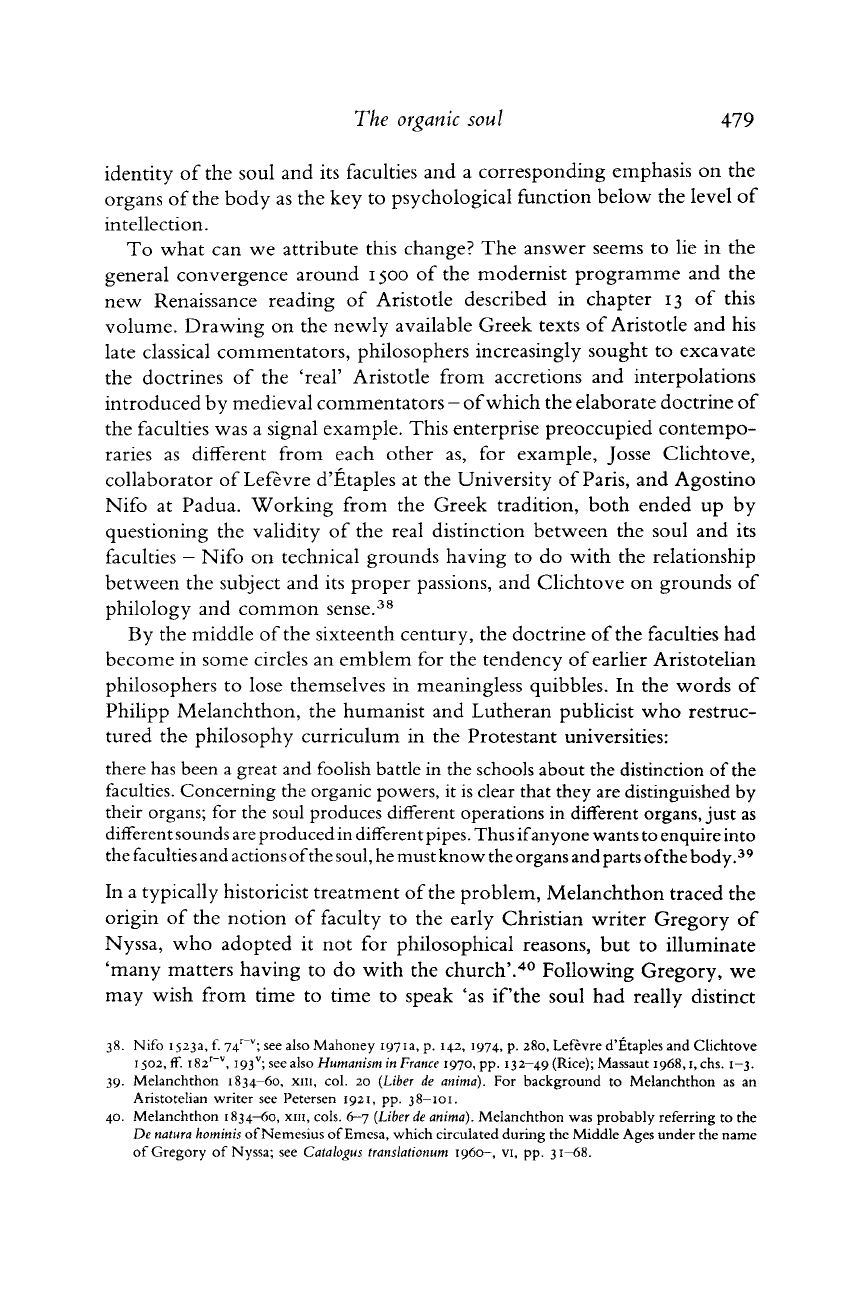
The
organic
soul
479
identity of the soul and its faculties and a corresponding emphasis on the
organs
of the body as the key to psychological function
below
the
level
of
intellection.
To
what can we attribute this change? The answer seems to lie in the
general
convergence around 1500 of the modernist programme and the
new Renaissance reading of Aristotle described in chapter 13 of this
volume. Drawing on the
newly
available Greek texts of Aristotle and his
late
classical commentators, philosophers increasingly sought to excavate
the doctrines of the 'real' Aristotle from accretions and interpolations
introduced by medieval
commentators
—
of
which the elaborate doctrine of
the faculties was a signal example. This enterprise preoccupied contempo-
raries
as different from each other as, for example, Josse Clichtove,
collaborator
of Lefevre d'Etaples at the University of
Paris,
and Agostino
Nifo
at Padua. Working from the Greek tradition, both ended up by
questioning the validity of the real distinction between the soul and its
faculties
—
Nifo
on technical grounds having to do with the relationship
between the subject and its proper passions, and Clichtove on grounds of
philology and common sense.
38
By
the middle of the sixteenth century, the doctrine of the faculties had
become in some circles an emblem for the tendency of
earlier
Aristotelian
philosophers to
lose
themselves in meaningless quibbles. In the words of
Philipp Melanchthon, the humanist and Lutheran publicist who
restruc-
tured
the philosophy curriculum in the Protestant universities:
there
has been a great and
foolish
battle in the schools about the distinction of the
faculties. Concerning the organic powers, it is clear that they
are
distinguished by
their
organs; for the soul produces different operations in different
organs,
just as
different sounds
are
produced
in
different pipes.
Thus
if
anyone
wants
to
enquire into
the faculties
and
actions
of
the soul,
he
must
know the
organs
and
parts
of
the body.
39
In a typically historicist treatment of the problem, Melanchthon traced the
origin of the notion of faculty to the early Christian writer Gregory of
Nyssa, who adopted it not for philosophical reasons, but to illuminate
'many
matters having to do with the church'.
40
Following Gregory, we
may
wish
from time to time to speak 'as if'the soul had really distinct
38.
Nifo
1523a, f. 74
r_v
; see
also
Mahoney
1971a, p. 142, 1974, p. 280, Lefevre
d'Etaples
and Clichtove
1502, ff.
i82
r_v
,
193
v
; see
also
Humanism in France 1970, pp.
132-49
(Rice);
Massaut 1968,1, chs. 1-3.
39.
Melanchthon
1834-60,
xm, col. 20 (Liber de anima). For
background
to
Melanchthon
as an
Aristotelian
writer
see
Petersen
1921, pp. 38-101.
40.
Melanchthon
1834-60,
xm,
cols.
6-7 (Liber de anima).
Melanchthon
was probably
referring
to the
De
natura hominis of
Nemesius
of
Emesa,
which
circulated
during
the Middle Ages
under
the
name
of Gregory of
Nyssa;
see Catalogus translationum
i960-,
vi, pp. 31-68.
Cambridge Histories Online © Cambridge University Press, 2008
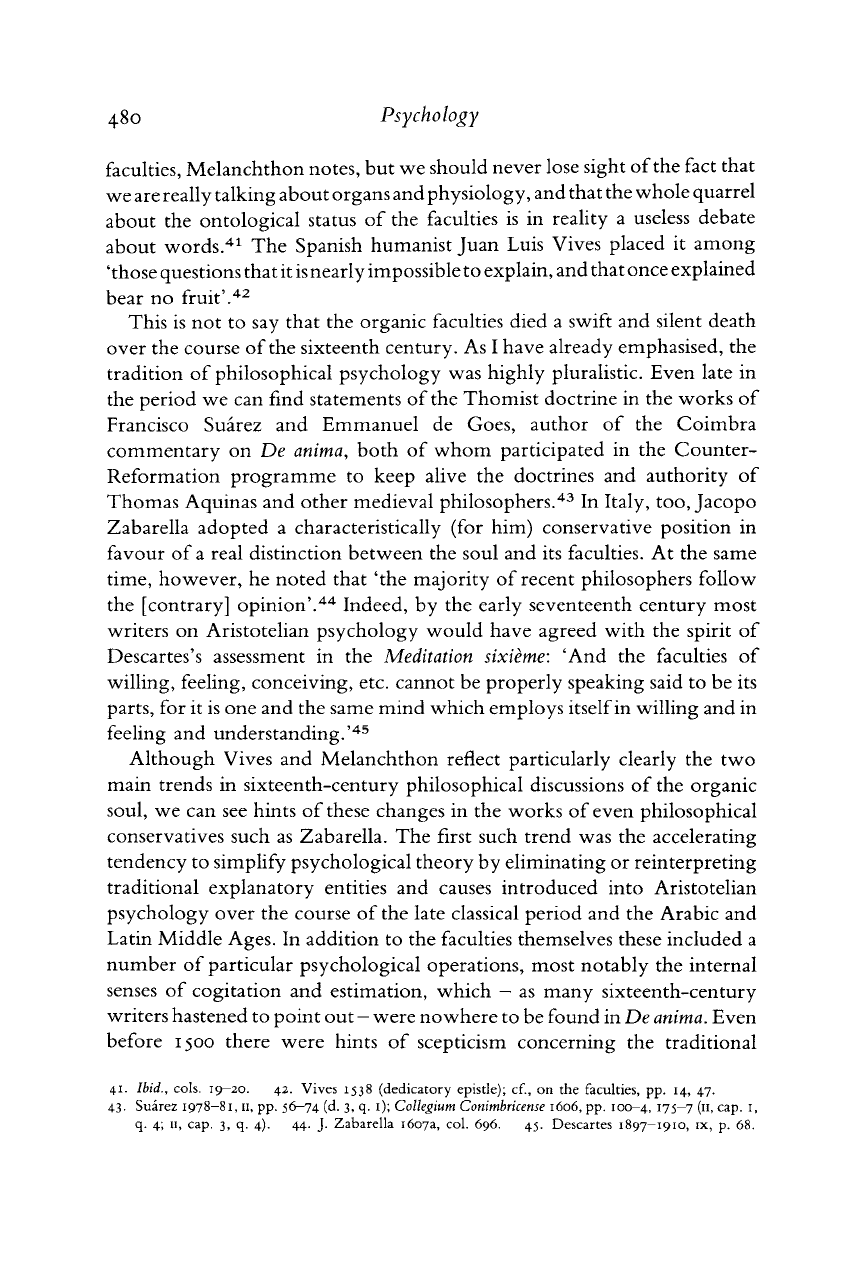
48o
Psychology
faculties, Melanchthon notes, but we should never
lose
sight
of
the
fact that
we
are
really
talking about
organs
and
physiology,
and
that
the whole
quarrel
about
the ontological status of the faculties is in reality a
useless
debate
about
words.
41
The Spanish humanist
Juan
Luis Vives placed it among
'those questions
that
it is
nearly
impossible to explain,
and
that
once explained
bear
no fruit'.
42
This is not to say that the organic faculties died a
swift
and silent death
over
the course of
the
sixteenth century. As I have already emphasised, the
tradition
of philosophical psychology was highly pluralistic. Even late in
the
period we can
find
statements of the Thomist doctrine in the works of
Francisco
Suârez and Emmanuel de Goes, author of the Coimbra
commentary
on De
anima,
both of whom participated in the Counter-
Reformation
programme to keep alive the doctrines and authority of
Thomas
Aquinas and other medieval philosophers.
43
In Italy, too,
Jacopo
Zabarella
adopted a characteristically (for him) conservative position in
favour
of
a
real
distinction between the soul and its faculties. At the same
time,
however, he noted that 'the majority of recent philosophers
follow
the
[contrary]
opinion'.
44
Indeed, by the early seventeenth century most
writers
on Aristotelian psychology would have agreed with the spirit of
Descartes's
assessment in the
Meditation
sixième:
'And the faculties of
willing,
feeling,
conceiving, etc. cannot be properly speaking said to be its
parts,
for it is one and the same mind which employs itself in
willing
and in
feeling
and understanding.'
45
Although Vives and Melanchthon reflect particularly clearly the two
main trends in sixteenth-century philosophical discussions of the organic
soul, we can see hints of these changes in the works of even philosophical
conservatives
such as Zabarella. The first such trend was the accelerating
tendency to simplify psychological theory by eliminating or reinterpreting
traditional
explanatory entities and causes introduced into Aristotelian
psychology over the course of the late classical period and the Arabic and
Latin
Middle Ages. In addition to the faculties themselves these included a
number
of
particular
psychological operations, most notably the internal
senses of cogitation and estimation, which - as many sixteenth-century
writers
hastened to point out
—
were nowhere to be found in De
anima.
Even
before
1500 there were hints of scepticism concerning the traditional
41. Ibid.,
cols.
19-20.
42.
Vives
1538
(dedicatory
epistle);
cf., on the
faculties,
pp. 14, 47.
43.
Suârez
1978-81,11, pp.
56—74
(d. 3, q. 1); Collegium Conimbricense 1606, pp.
100-4,
I75
_
7
(n, cap. 1,
q. 4; 11, cap. 3, q. 4). 44. J.
Zabarella
1607a,
col. 696. 45.
Descartes
1897-1910,
ix, p. 68.
Cambridge Histories Online © Cambridge University Press, 2008
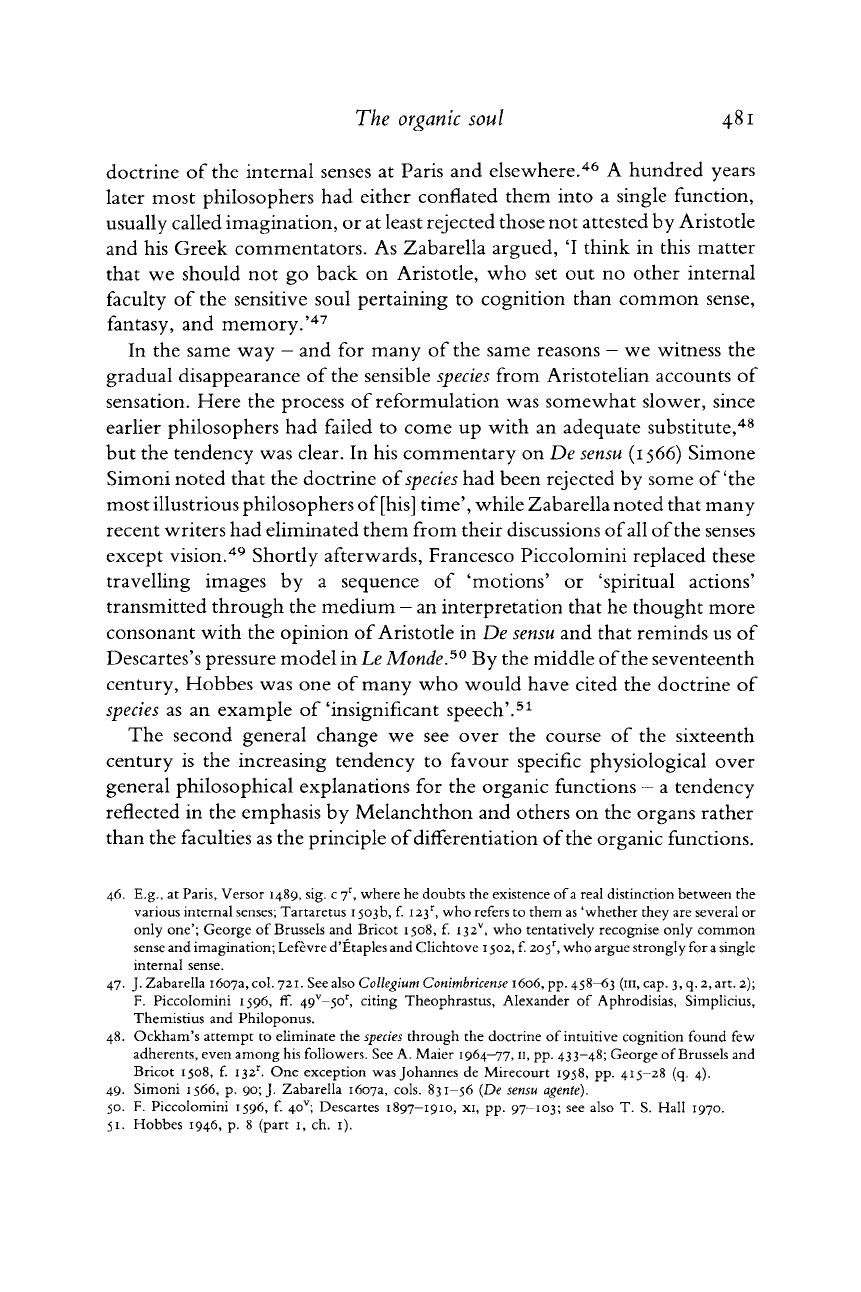
The
organic
soul
doctrine
of the internal
senses
at Paris and elsewhere.
46
A hundred years
later
most philosophers had either conflated them into a
single
function,
usually called imagination, or at least rejected those not attested by Aristotle
and his Greek commentators. As Zabarella argued, 'I think in this matter
that
we should not go back on Aristotle, who set out no other internal
faculty of the sensitive soul pertaining to cognition than common sense,
fantasy,
and memory.'
47
In the same way
—
and for many of the same reasons
—
we witness the
gradual
disappearance of the
sensible
species
from Aristotelian accounts of
sensation. Here the process of reformulation was somewhat slower, since
earlier
philosophers had failed to come up with an adequate substitute,
48
but the tendency was clear. In his commentary on De
sensu
(1566)
Simone
Simoni noted that the doctrine
of
species
had been rejected by some of'the
most illustrious philosophers
of
[his] time',
while
Zabarella
noted that many
recent
writers had eliminated them from their discussions
of
all
of
the
senses
except
vision.
49
Shortly afterwards, Francesco Piccolomini replaced these
travelling images by a sequence of 'motions' or 'spiritual actions'
transmitted
through the medium
—
an interpretation that he thought more
consonant with the opinion of Aristotle in De
sensu
and that reminds us of
Descartes's pressure model in Le
Monde.
50
By the middle
of
the seventeenth
century,
Hobbes was one of many who
would
have cited the doctrine of
species
as an example of 'insignificant speech'.
51
The
second general change we see over the course of the sixteenth
century
is the increasing tendency to favour specific physiological over
general
philosophical explanations for the organic functions
—
a tendency
reflected in the emphasis by Melanchthon and others on the organs
rather
than
the faculties as the principle
of
differentiation
of
the organic functions.
46. E.g., at Paris, Versor 1489, sig. c j
T
,
where
he
doubts
the
existence
of a
real
distinction
between
the
various
internal
senses;
Tartaretus 1503
b,
f. 123
1
", who
refers
to
them
as
'whether
they
are
several
or
only
one'; George of
Brussels
and Bricot 1508, f.
i32
v
,
who
tentatively
recognise
only
common
sense
and
imagination;
Lefevre
d'Etaples
and Clichtove 1502, f.
205
r
,
who argue
strongly
for
a
single
internal
sense.
47. J. Zabarella 1607a, col. 721. See
also
Collegium Conimbricense 1606, pp.
458—63
(in, cap. 3, q. 2, art. 2);
F.
Piccolomini
1596, ff.
49
v
~50
r
,
citing
Theophrastus, Alexander of Aphrodisias,
Simplicius,
Themistius
and
Philoponus.
48. Ockham's
attempt
to
eliminate
the
species
through
the
doctrine
of
intuitive
cognition
found
few
adherents,
even
among
his
followers.
See A. Maier 1964—77,11, pp.
433-48;
George of
Brussels
and
Bricot 1508, f.
i32
r
.
One
exception
was
Johannes
de Mirecourt 1958, pp.
415-28
(q. 4).
49.
Simoni
1566, p. 90; J. Zabarella 1607a,
cols.
831-56
(De sensu agente).
50. F.
Piccolomini
1596, f. 40
v
;
Descartes
1897-1910, xi, pp. 97-103; see
also
T. S. Hall 1970.
51.
Hobbes
1946, p. 8
(part
1, ch. 1).
Cambridge Histories Online © Cambridge University Press, 2008
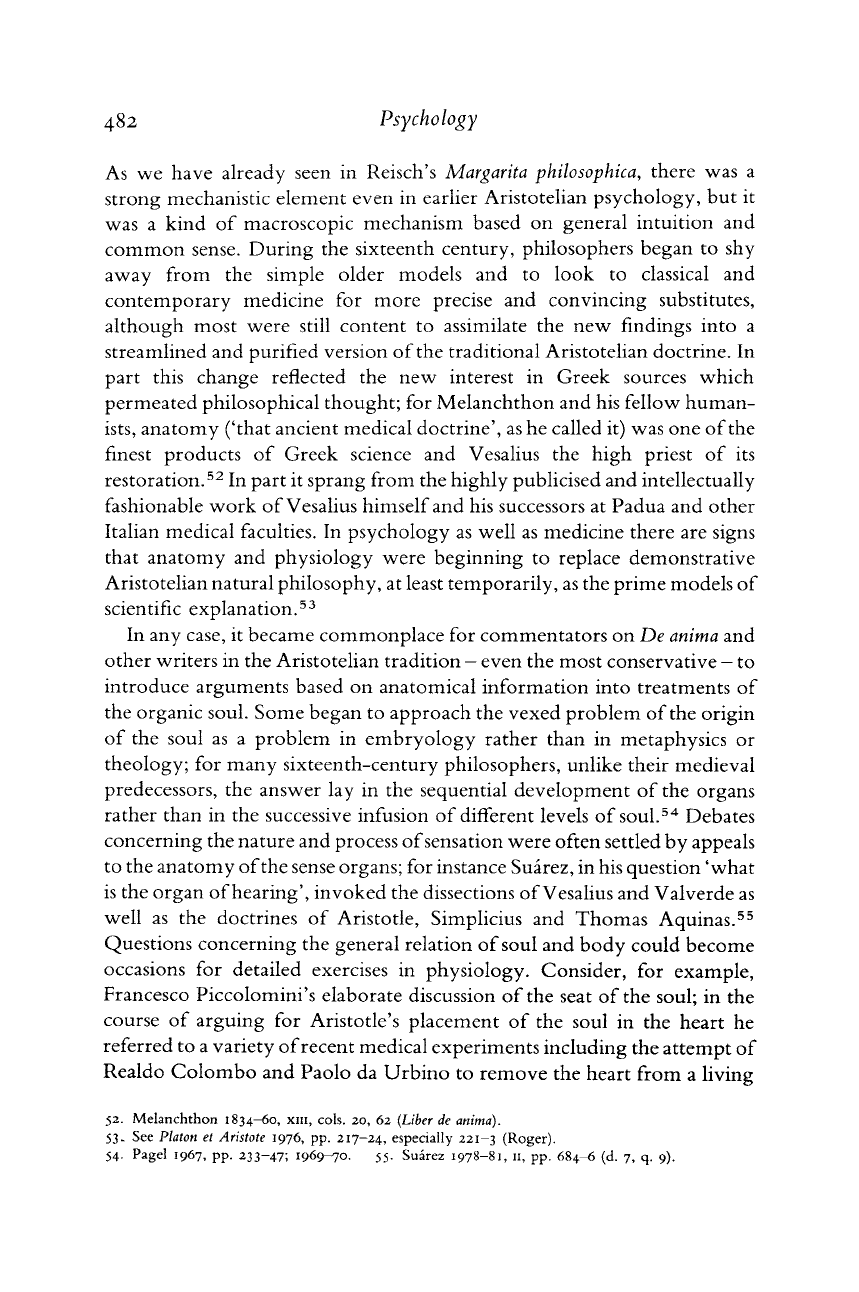
482
Psychology
As we have already
seen
in Reisch's
Margarita
philosophica,
there was a
strong mechanistic element even in earlier Aristotelian psychology, but it
was a kind of macroscopic mechanism based on general intuition and
common sense. During the sixteenth century, philosophers began to shy
away from the simple older models and to look to classical and
contemporary
medicine for more precise and convincing substitutes,
although most were
still
content to assimilate the new findings into a
streamlined and purified version of the traditional Aristotelian doctrine. In
part
this change reflected the new interest in Greek sources which
permeated
philosophical thought; for Melanchthon and his
fellow
human-
ists, anatomy ('that ancient medical doctrine', as he called it) was one
of
the
finest products of Greek science and Vesalius the high priest of its
restoration.
52
In
part
it sprang from the highly publicised and intellectually
fashionable work of Vesalius himself and his successors at Padua and other
Italian
medical faculties. In psychology as
well
as medicine there are
signs
that
anatomy and physiology were beginning to replace demonstrative
Aristotelian
natural
philosophy, at least temporarily, as the prime models of
scientific explanation.
53
In any case, it became commonplace for commentators on De
anima
and
other
writers in the Aristotelian tradition
—
even the most conservative
—
to
introduce
arguments based on anatomical information into treatments of
the organic soul. Some began to approach the vexed problem
of
the origin
of
the soul as a problem in embryology
rather
than in metaphysics or
theology; for many sixteenth-century philosophers, unlike their medieval
predecessors,
the answer lay in the sequential development of the organs
rather
than in the successive
infusion
of different
levels
of soul.
54
Debates
concerning the nature and process
of
sensation were often settled by appeals
to
the anatomy
of
the sense
organs;
for instance Suarez, in his question 'what
is the organ
of
hearing', invoked the dissections
of
Vesalius and Valverde as
well
as the doctrines of Aristotle, Simplicius and Thomas Aquinas.
55
Questions concerning the general relation of soul and body could become
occasions for detailed exercises in physiology. Consider, for example,
Francesco
Piccolomini's elaborate discussion of the seat of the soul; in the
course
of arguing for Aristotle's placement of the soul in the heart he
referred
to a variety
of
recent
medical experiments including the attempt of
Realdo Colombo and Paolo da Urbino to remove the heart from a
living
52.
Melanchthon
1834-60,
xm,
cols.
20, 62 {Liber de anima).
53. See Platon et Aristote 1976, pp. 217-24,
especially
221-3
(Roger).
54. Pagel 1967, pp.
233-47;
1969-70.
55.
Suarez
1978-81, 11, pp.
684-6
(d. 7, q. 9).
Cambridge Histories Online © Cambridge University Press, 2008
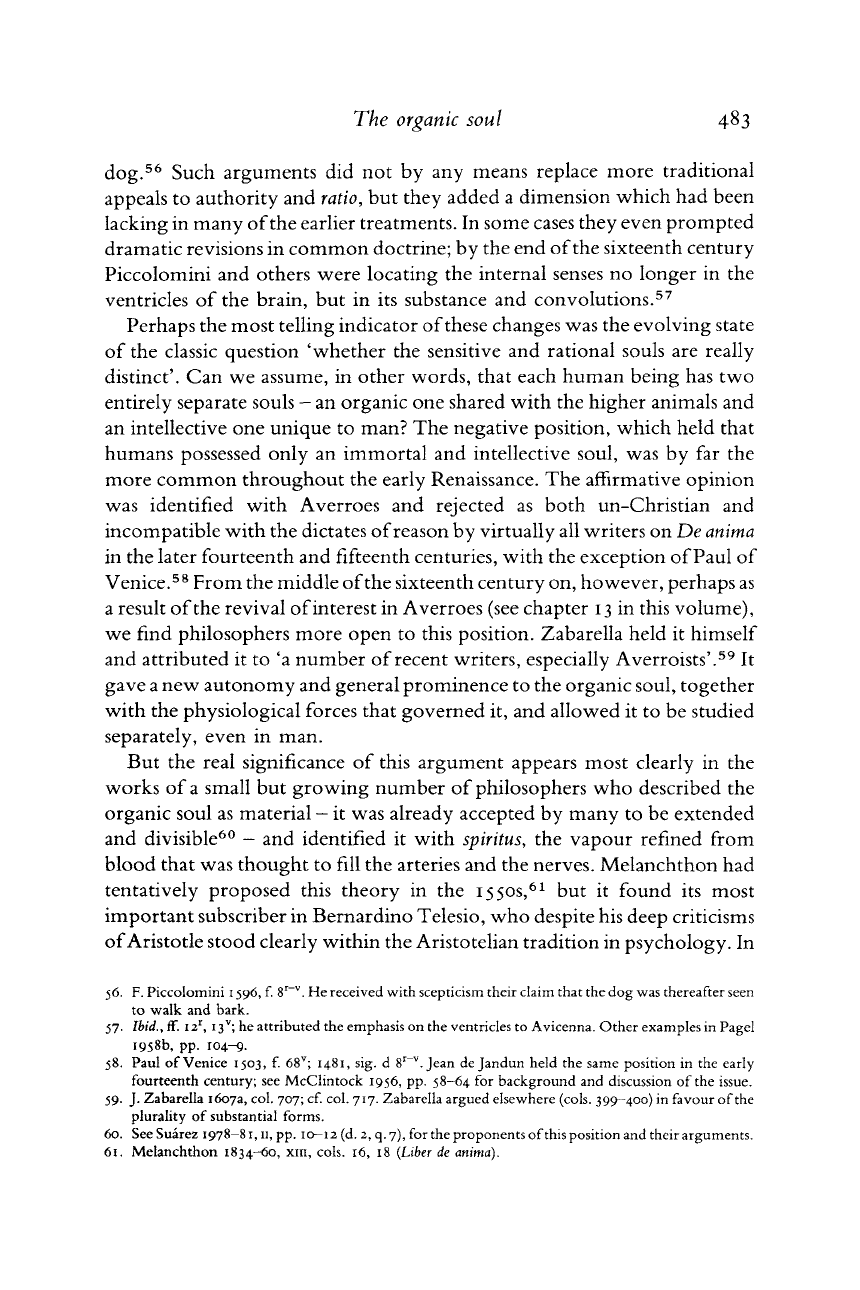
The
organic
soul
483
dog.
56
Such arguments did not by any means replace more traditional
appeals to authority and
ratio,
but they added a dimension which had been
lacking in many
of
the earlier
treatments.
In some cases they even prompted
dramatic
revisions in common
doctrine;
by the end
of
the sixteenth century
Piccolomini and others were locating the internal
senses
no longer in the
ventricles of the brain, but in its substance and convolutions.
57
Perhaps
the most
telling
indicator
of
these changes was the
evolving
state
of
the classic question 'whether the sensitive and rational
souls
are really
distinct'. Can we assume, in other words, that each human
being
has two
entirely separate
souls
—
an organic one shared with the higher animals and
an
intellective one unique to man? The negative position, which held that
humans possessed only an immortal and intellective soul, was by far the
more
common throughout the early Renaissance. The affirmative opinion
was identified with Averroes and rejected as both un-Christian and
incompatible with the dictates
of
reason
by virtually all writers on De
anima
in the later fourteenth and fifteenth centuries, with the exception
of
Paul
of
Venice.
58
From
the middle
of
the sixteenth century on, however, perhaps as
a
result
of
the revival
of
interest in Averroes (see chapter
13
in this volume),
we
find
philosophers more open to this position. Zabarella held it himself
and attributed it to 'a number of
recent
writers, especially Averroists'.
59
It
gave
a
new autonomy and general prominence to the organic soul, together
with the physiological forces that governed it, and allowed it to be studied
separately,
even in man.
But
the real significance of this argument appears most clearly in the
works of
a
small but growing number of philosophers who described the
organic
soul as material
—
it was already accepted by many to be extended
and
divisible
60
—
and identified it with spiritus, the vapour refined from
blood that was thought to
fill
the arteries and the nerves. Melanchthon had
tentatively proposed this theory in the
1550s,
61
but it found its most
important
subscriber in
Bernardino
Telesio, who despite his deep criticisms
of
Aristotle stood clearly within the Aristotelian tradition in psychology. In
56. F.
Piccolomini
1596, f. 8
r
~
v
. He
received
with
scepticism
their
claim
that the dog was
thereafter
seen
to walk and bark.
57. Ibid., ff. i2
r
, i3
v
; he
attributed
the
emphasis
on the
ventricles
to Avicenna. Other
examples
in Pagel
1958b, pp.
104-9.
58. Paul of
Venice
1503, f. 68
v
; 1481, sig. d 8
r_v
.
Jean
dejandun
held
the
same
position
in the
early
fourteenth
century;
see McClintock 1956, pp.
58-64
for background and
discussion
of the
issue.
59. J. Zabarella 1607a, col. 707; cf. col. 717. Zabarella
argued
elsewhere
(cols.
399-400)
in favour of the
plurality of
substantial
forms.
60. See Suarez 1978-81,11, pp. 10-12 (d. 2, q. 7), for the
proponents
of
this
position
and
their
arguments.
61.
Melanchthon
1834-60,
xm,
cols.
16, 18 (Liber de anima).
Cambridge Histories Online © Cambridge University Press, 2008
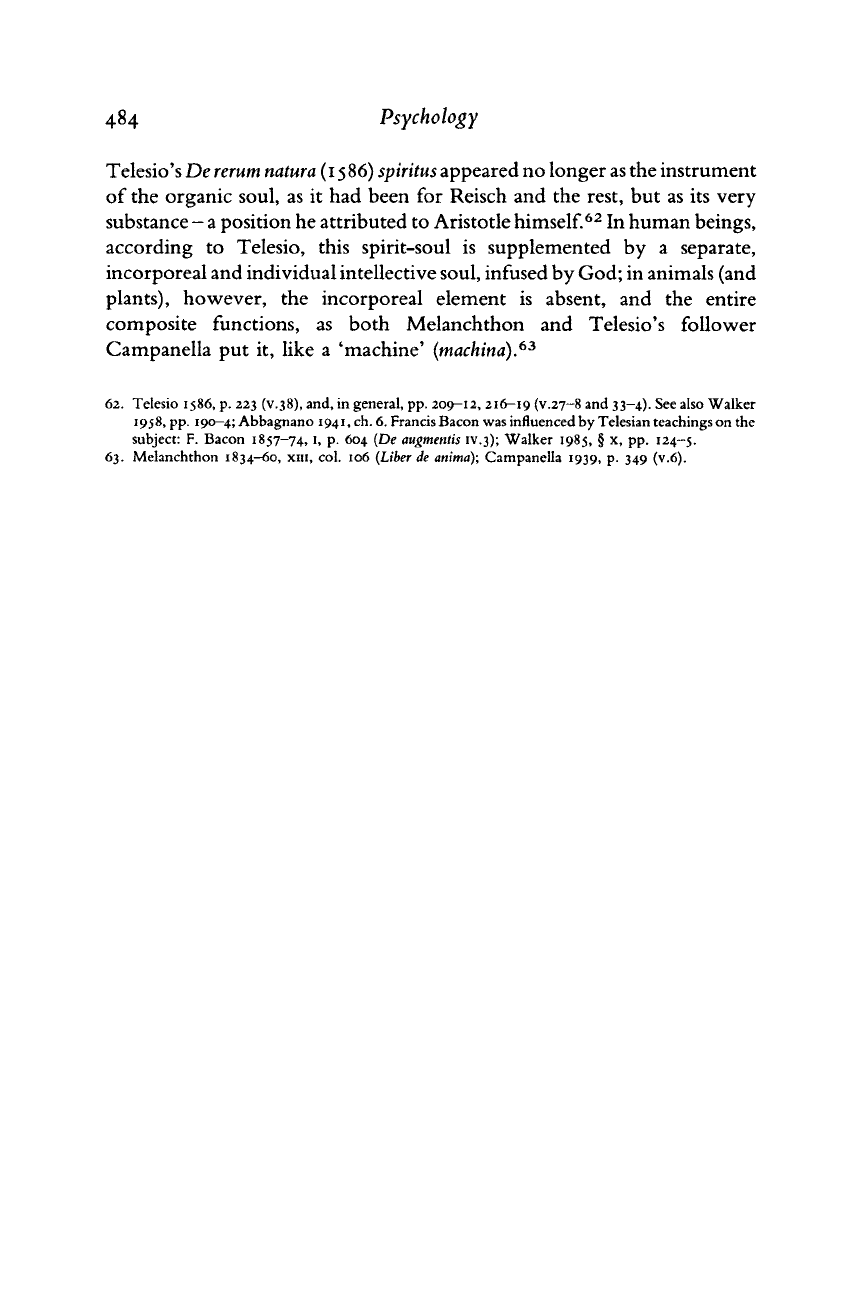
484
Psychology
Telesio's De
return
natura
(i
586)
spiritus
appeared no longer as the instrument
of the organic soul, as it had been for Reisch and the rest, but as its very
substance
—
a
position he attributed to Aristotle
himself.
62
In human beings,
according
to Telesio, this spirit-soul is supplemented by a separate,
incorporeal and individual intellective soul, infused by
God;
in animals (and
plants), however, the incorporeal element is absent, and the entire
composite functions, as both Melanchthon and Telesio's follower
Campanella
put it, like a 'machine'
(machina).
63
62.
Telesio
1586, p. 223 (v.38),
and,
in
general,
pp. 209-12, 216-19 (v.27-8 and 33-4). See
also
Walker
1958,
pp.
190-4;
Abbagnano
1941,
ch.
6.
Francis
Bacon
was
influenced
by
Telesian
teachings
on the
subject:
F.
Bacon
1857-74, 1, p. 604 {De augmentis iv.3);
Walker
1985, § x, pp. 124-5.
63.
Melanchthon
1834-60, xm, col. 106
{Liber
de anima);
Campanella
1939, p. 349 (v.6).
Cambridge Histories Online © Cambridge University Press, 2008
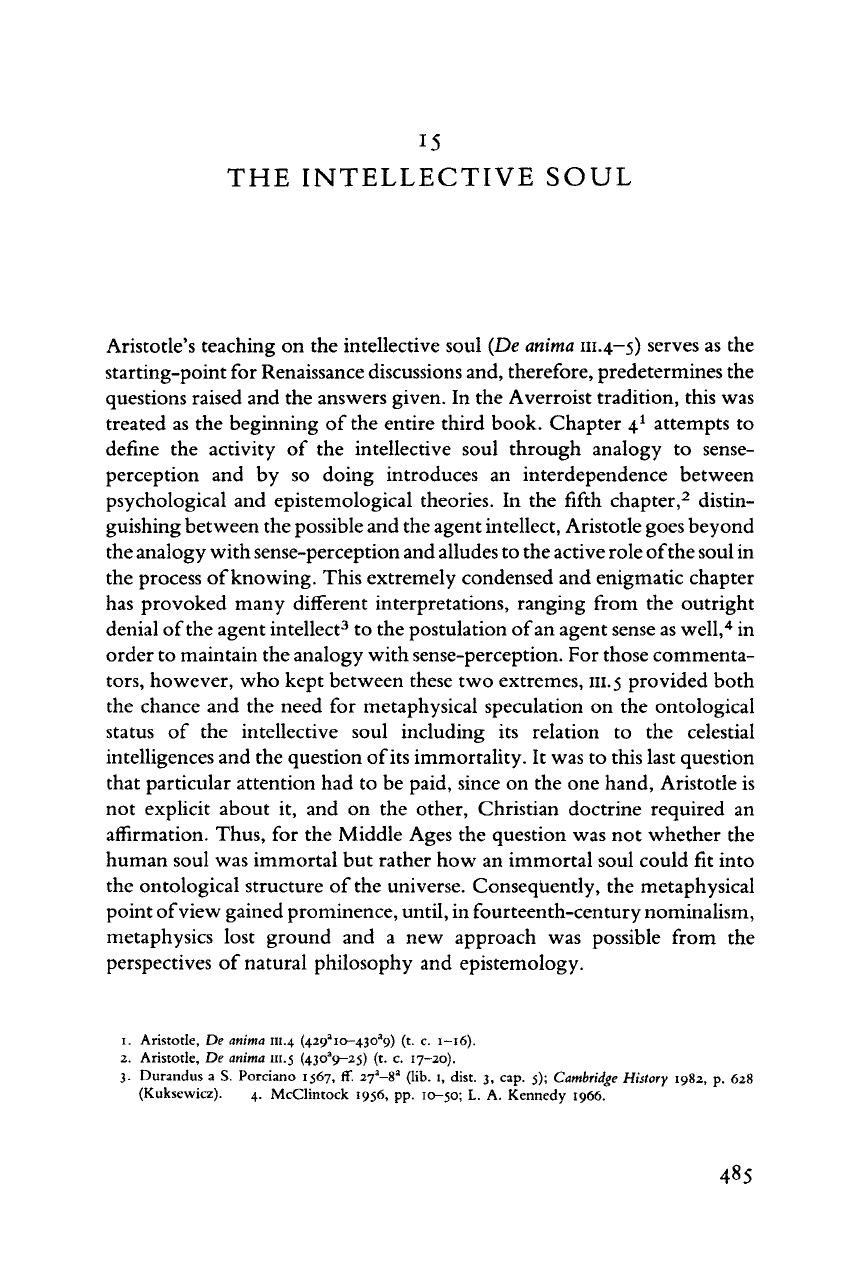
15
Aristotle's teaching on the intellective soul (De
anima
111.4-5)
serves as the
starting-point for Renaissance
discussions
and, therefore, predetermines the
questions raised and the answers given. In the Averroist tradition, this was
treated as the beginning of the entire third book.
Chapter
4
1
attempts to
define the activity of the intellective soul through analogy to
sense-
perception and by so doing introduces an interdependence between
psychological
and epistemological theories. In the fifth chapter,
2
distin-
guishing between the possible and the agent intellect, Aristotle
goes
beyond
the analogy with sense-perception and alludes to the active role of the soul in
the process of
knowing.
This extremely condensed and enigmatic chapter
has provoked many different interpretations, ranging from the outright
denial of the agent intellect
3
to the postulation of an agent
sense
as well,
4
in
order to maintain the analogy with sense-perception. For
those
commenta-
tors, however, who kept between
these
two extremes,
111.5
provided both
the chance and the
need
for metaphysical speculation on the ontological
status of the intellective soul including its relation to the celestial
intelligences and the question of its immortality. It was to this last question
that
particular attention had to be paid,
since
on the one hand, Aristotle is
not explicit about it, and on the other, Christian doctrine required an
affirmation.
Thus,
for the Middle Ages the question was not whether the
human soul was immortal but rather how an immortal soul could fit into
the ontological structure of the universe. Consequently, the metaphysical
point of view gained prominence, until, in fourteenth-century nominalism,
metaphysics
lost
ground and a new approach was possible from the
perspectives of natural philosophy and epistemology.
1.
Aristotle,
De
anima
111.4
(429*
10-43°
a
9) (
c
- c.
1-16).
2.
Aristotle,
De
anima
111.5
(430*9-25)
(t. c. 17-20).
3.
Durandus
a S.
Porciano
1567, flf. 27
a
-8
a
(lib. 1,
dist.
3, cap. 5);
Cambridge
History
1982, p. 628
(Kuksewicz).
4.
McClintock
1956, pp. 10-50; L. A.
Kennedy
1966.
485
THE
INTELLECTIVE
SOUL
Cambridge Histories Online © Cambridge University Press, 2008
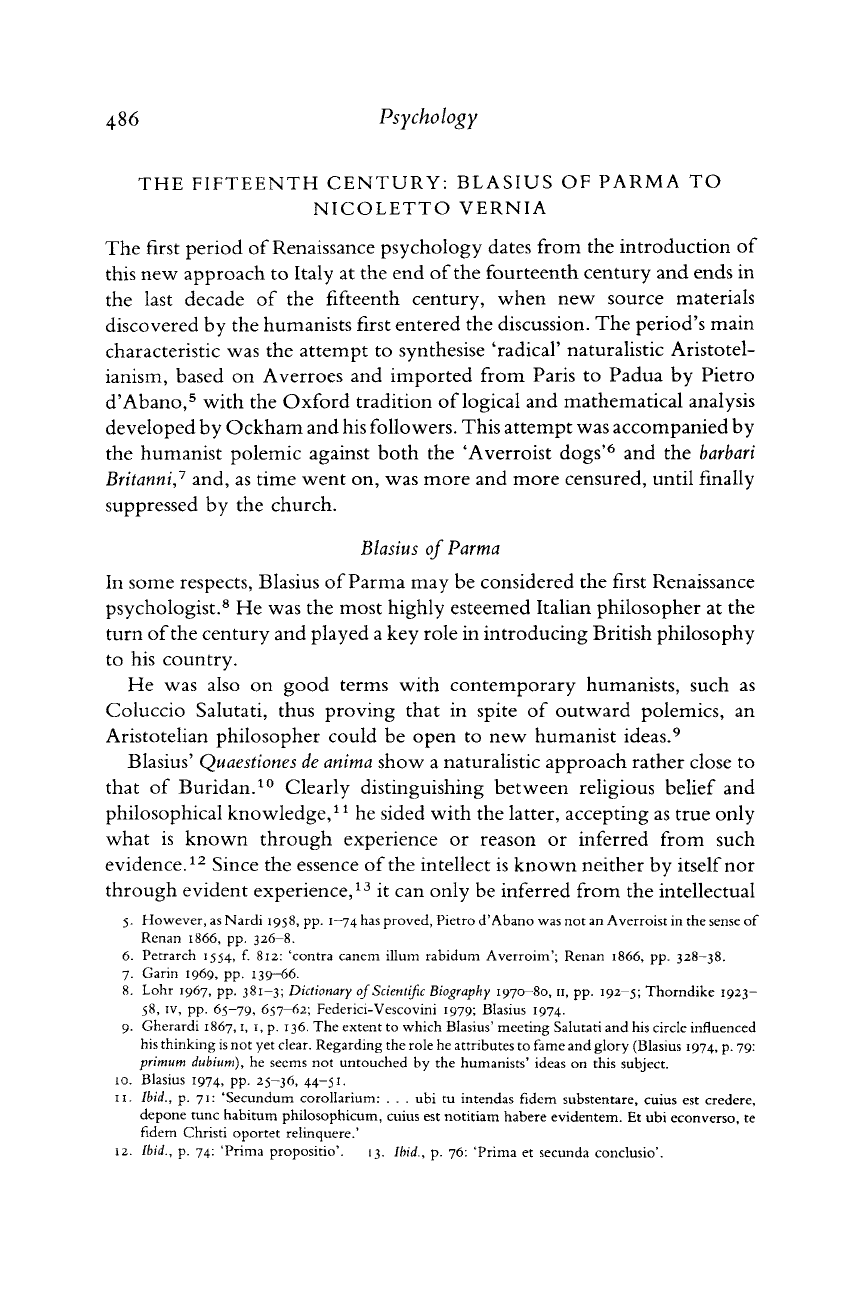
486
Psychology
THE
FIFTEENTH
CENTURY:
BLASIUS
OF
PARMA
TO
NICOLETTO
VERNIA
The
first period of
Renaissance
psychology dates from the introduction of
this new
approach
to Italy at the end of
the
fourteenth century and ends in
the
last decade of the fifteenth century, when new source materials
discovered
by the humanists first entered the discussion. The period's main
characteristic
was the attempt to synthesise
'radical'
naturalistic Aristotel-
ianism, based on Averroes and imported from
Paris
to Padua by Pietro
d'Abano,
5
with the Oxford tradition of logical and mathematical analysis
developed by Ockham and his followers. This
attempt
was
accompanied
by
the
humanist polemic against both the 'Averroist dogs'
6
and the
barbari
Britanni
7
and, as time went on, was more and more censured, until finally
suppressed by the
church.
Blasius
of
Parma
In
some respects, Blasius of
Parma
may be considered the first Renaissance
psychologist.
8
He was the most highly esteemed Italian philosopher at the
turn
of
the
century and played a key role in introducing British philosophy
to
his country.
He
was also on good terms with contemporary humanists, such as
Coluccio
Salutati, thus proving that in spite of outward polemics, an
Aristotelian
philosopher could be open to new humanist ideas.
9
Blasius'
Quaestiones
de
anima
show a
naturalistic
approach
rather
close to
that
of Buridan.
10
Clearly distinguishing between religious belief and
philosophical knowledge,
11
he sided with the
latter,
accepting as
true
only
what
is known through experience or reason or inferred from such
evidence.
12
Since the essence of the intellect is known neither by itself
nor
through
evident experience,
13
it can only be inferred from the intellectual
5. However, as Nardi 1958, pp. 1-74 has proved, Pietro d'Abano was not an Averroist in the
sense
of
Renan 1866, pp.
326-8.
6. Petrarch 1554, f. 812: 'contra
canem
ilium
rabidum Averroim'; Renan 1866, pp.
328-38.
7. Garin 1969, pp. 139—66.
8. Lohr 1967, pp. 381-3; Dictionary of
Scientific
Biography
1970-80,
11,
pp. 192-5; Thorndike 1923-
58, iv, pp. 65-79, 657-62; Federici-Vescovini 1979;
Blasius
1974.
9. Gherardi 1867,1, 1, p. 136. The
extent
to which Blasius'
meeting
Salutati and his circle
influenced
his thinking is not yet clear. Regarding the
role
he attributes to fame and glory
(Blasius
1974, p. 79:
primum dubium), he
seems
not
untouched
by the
humanists'
ideas
on
this
subject.
10.
Blasius
1974, pp. 25-36, 44-51.
11.
Ibid., p. 71: 'Secundum corollarium: . . . ubi tu
intendas
fidem
substentare,
cuius
est credere,
depone
tunc habitum philosophicum,
cuius
est
notitiam
habere evidentem. Et ubi
econverso,
te
fidem
Christi oportet relinquere.'
12.
Ibid., p. 74: 'Prima propositio'. 13. Ibid., p. 76: 'Prima et
secunda
conclusio'.
Cambridge Histories Online © Cambridge University Press, 2008
